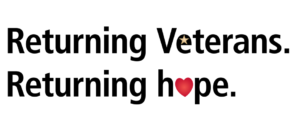 This is the first post in a series featuring people, congregations and organizations working with veterans who have experienced the trauma of war. The Peace and Justice Support Network, a joint project of Mennonite Mission Network and Mennonite Church USA, offers a six-week Sunday School curriculum, Returning Veterans, Returning Hope, focused on returning veterans and how the church can play a part in their healing journeys. This curriculum draws from biblical reflection, the latest understandings of trauma and moral injury, and the experiences of veterans themselves.
This is the first post in a series featuring people, congregations and organizations working with veterans who have experienced the trauma of war. The Peace and Justice Support Network, a joint project of Mennonite Mission Network and Mennonite Church USA, offers a six-week Sunday School curriculum, Returning Veterans, Returning Hope, focused on returning veterans and how the church can play a part in their healing journeys. This curriculum draws from biblical reflection, the latest understandings of trauma and moral injury, and the experiences of veterans themselves.
Jason Boone is the coordinating minister of the Peace and Justice Support Network.
At a conference exploring moral injury, the spiritual trauma many veterans experience in the aftermath of combat, a young veteran of the wars in Afghanistan stood to share his story.
“I went to war believing I was serving God by fighting evil. I saw things in combat that I knew could not be the will of God. Now I don’t know who God is anymore. I don’t know who I am either. I don’t know who I am.”
I spoke with him briefly during a break. He said he was fighting the urge to leave and get as far away as he could from hearing about the horror that war can bring. He stayed, he said, because he was searching for healing and relief.
He had accessed the services of the Veterans Administration, of psychiatrists, the support of peers. Those helped. But they could not help answer the questions: Who is God? Who am I?
That quest is the essence of our work with returning veterans. Veterans who long to find God need the church. With all appreciation and respect for other denominations and theologies, they need a church that worships a God who looks like Jesus. And they need a community of folks who encourage each other in becoming more like Jesus. In Christ we find the eternal identity that gives life.
A bloodthirsty, Janus-faced God who espouses love on one hand but sends humans to kill on the other is a lie. Discipleship that demands violence and war is a cruel deception that damages everything it touches, including the hearts, minds and spirits of men and women.
The church can’t heal all wounds for everyone. But a church that keeps Jesus at its center has a better chance at helping men and women who experience moral injury than anything else.
We must open our hearts and our doors to the veterans in our communities.
Even more, we must take the church outside of its walls and bring it to these men and women. We have a message that too many veterans long to hear. We can’t keep it to ourselves.
“Who is God? Who am I?”
“God is love and you are beloved. Let us experience it together.”


